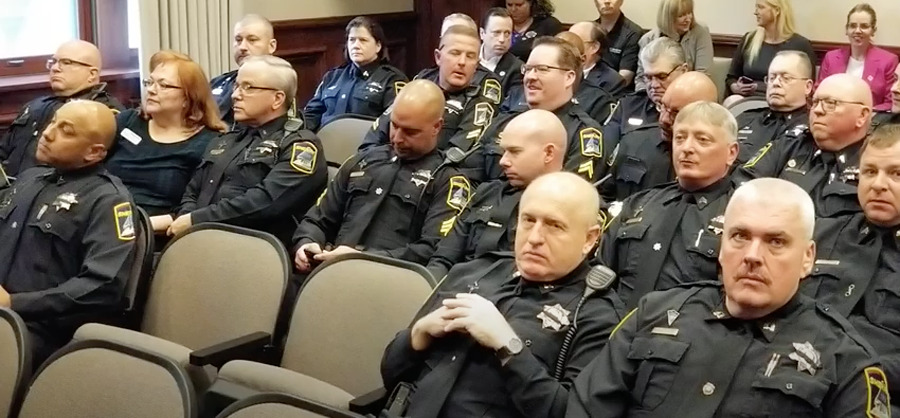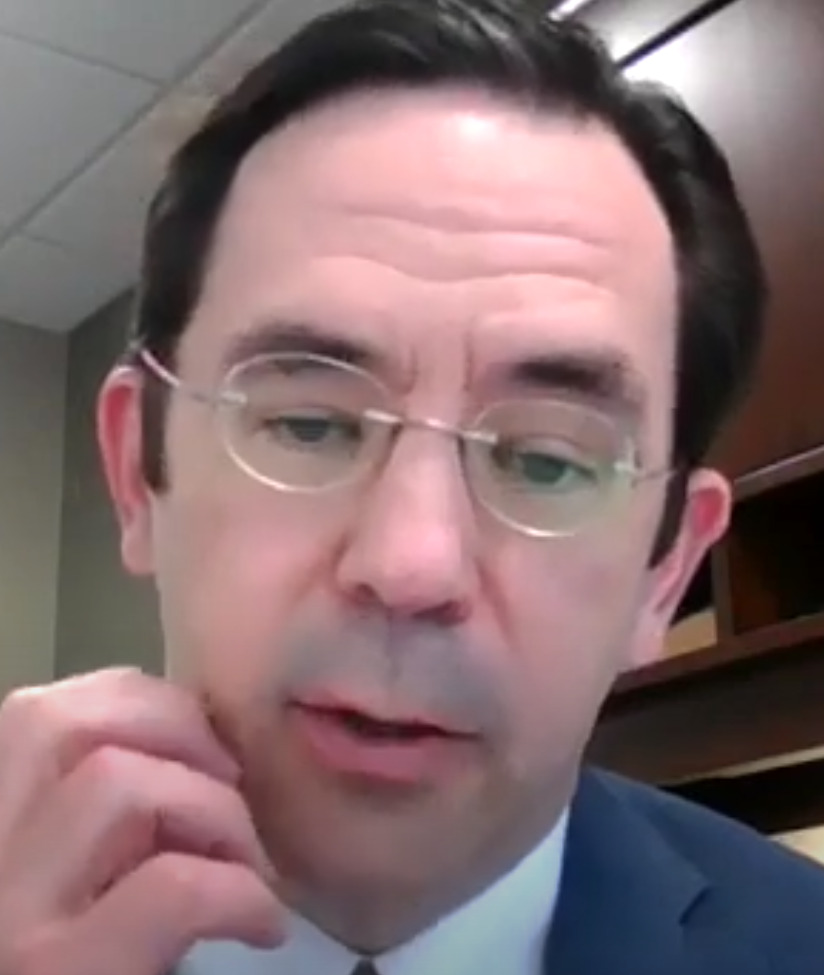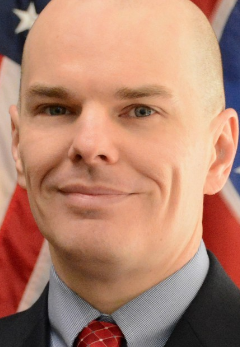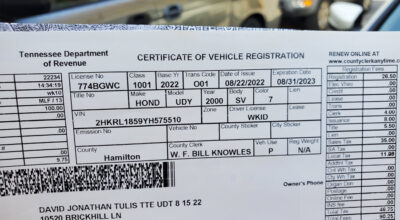
Brass from the Hamilton County sheriff’s office in mass formation at a county commission meeting. The department violates law repeatedly in any “traffic stop” alleging “no insurance” because its victims have not first been involved in what state law calls a “qualifying crash” at T.C.A § 55-12-104. (Photo David Tulis)

The department of revenue at 500 Deaderick St. in Nashville runs an insurance cartel-boosting fraud guaranteeing the industry at least F$1 billion in coerced premiums yearly in breach of T.C.A §55-12-101 et seq. Until today, no one has brought this fraud to the commissioner of revenue’s attention, and he is unwilling to meet for a deposition to discuss the facts of this mass injury against the traveling and driving public. (Photo Google)

David Gerregano, commissioner of revenue
CHATTANOOGA, Tenn., Tuesday, Nov. 21, 2023 – My suit to overthrow state government’s insurance fraud scheme serving 350 certified insurance companies is dealt a blow at a hearing — a flesh wound at best, with scarce any loss of blood.
By David Tulis / NoogaRadio Network
The administrative hearing officer quashes my motion to depose and rejects my motion to compel, granting Cmsr. David Gerregano’s motion to quash an interrogation I have been planning on giving him over his department’s abrogation of T.C.A. § 55-12-101 et seq, the Tennessee financial responsibility law of 1977, aka “the insurance law” for owners and drivers of motor vehicles in Tennessee.
Tennessee is an after-crash voluntary insurance state, all our court cases say. But the law is administered is if it were a compulsory insurance state. The breach has been in effect since at least 2017, perhaps as early as 2002. The actions by officials involve official misconduct and official oppression under Tennessee’s criminal law in Title 39.
My suit for a contested case hearing is in the department of revenue that administers the EIVS system, or insurance database mining program letting cops instantly verify whether a motorist has insurance. By law, only motorists under suspension or courtroom conviction are required to have insurance as condition of driver license and vehicle registration. I am suing to restore registration on my 2000 Honda Odyssey minivan, which the cmsr. deleted without my getting a hearing. It is relegated to being an automobile and car once again, denied its high status in commerce as a “motor vehicle.”
The hearing runs an hour, and is by phone, involving the hearing officer Buchanan and Gerregano attorney Camille Cline. Mrs. Cline was not going to restate highlights of her brief, but I ask her to summarize it for my benefit, which she does at length. My turn is next.
Official misconduct, official oppression

Brad Buchanan has been working for the Tennessee revenue department for nearly a year, having 18 years behind him as an attorney in state government. (Photo Brad Buchanan)
Brad Buchanan, administrative judge Thank you, Miss Cline. Mr. Tulis, would you like to respond?
David Tulis Yes, Miss Cline. Thank you very much. That’s very helpful to hear you discuss that. I really appreciate it. Well, again, I don’t want to repeat or make reference, Mr. Buchanan, to the brief that you’ve read.
But, No. 1, I would say for deposition why I have a right – the petitioner has a right to depose him is that he is the moving party in every revocation and I go into detail on the long 104, 114 118, 127, 124 – so it was a matter of law he’s a moving party. He’s involved in 24,338 convictions a year. That was the 2022 figure. And there are 1.025 million unconfirmed registered cars without insurance on the road.
So that’s a lot of people. And he is bound by the doctrine of respondeat superior, “let the head speak.” I’m not gonna ask to speak to some flunky. The man, the man who’s revoked my registration named so in the statute has to be able to account for it and as he does upon thousands of other people. This case, Mr. Buchanan is, I would say – it’s a comprehensive attack on a mass on mass fraud. And he has a duty to let me ask him about the facts.
I do not agree that I would be hectoring him about legal conclusions. I know that a deposition has to be about facts. That’s what this – this objection and motion to compel are about. As for his importance in high, high status, the “apex figure” as Miss Camille says, I would say that this case is the first challenge to a scam that’s at least 6 years old.
And I would ask about the larger context of this petition. And that would be how many days in jail, how many hours in court, how many dollars in impound and towing fees, how many blighted records, Mr. Buchanan, how much fear and dread, how many 10s of thousands of people have to be affected? How do you count those figures needed to get the answers and the explanation on the facts of this case?
Again, deposition is about facts.
As for his precious time, Mr. Buchanan, I would say that the time devoted to the facts of this case would be 1% of the time that he would do in preparing, and 99% on the department operations. This case is typical of all these cases and the only difference is the name, the VIN, the address and the, you know, the make and model. That’s it. Otherwise he needs to know what’s going on in his apartment.
So No. 3, I would say that his importance is all the more reason that he should be deposed, to sit down vis a vis the victim. And he is involved, as I’ve alluded to, in the 39-16-402 violations that’s official misconduct and also 39-16-403 – that’s official oppression. That’s happening in this case. This case is part of the reckoning that’s due to me. And it’s also part of the reckoning that the people of this state are are due and I would say they’re overdue.
‘That’s what I’m shooting for. Junking this program’
So I have, I have from the beginning represented the law itself.That’s 55-12-101 et seq and I’m upholding the law and the man responsible has a duty, and I and I have a right in that duty, to draw out all the facts and having standing to investigate irregularities, and by questioning deposition, the admissions and denials.And – what’s happening in this case highlights something that’s impeachable to Governor Lee and it’s indictable to Commissioner Gargano.
And so the argument No. 4 that I made allusion to is the complete record requirement under the Uniform Administrative Procedures Act. I have, I have to set all the boundaries of the data in this case here – in your court, Mr. Buchanan. I have a duty to exhaust these remedies and the record that goes up will be based – and it can’t be, it can’t be amended unless there’s an order from Chancery *** that something be done differently than what you allow. So in the administrative hearing, all the facts must be established there. The testimony from the commissioner, I believe, will show that there are facts of policy now. And I wanna put into your ear the points I think don’t know if they come out in my brief, in my in my motion on this.

Tulis Report airs live in Chattanooga on three FM radio stations, on FB at TNtrafficticket, and online at a link provided at Noogaradio.com.
But policy is very fact rich. With law, you know, law, the law doesn’t have a lot of facts generated, right? But policy does. And so my questions to him – on the facts – a very restrained line of questioning on the facts – would be where does the law operate in your, in your, this part of your, your business as the commissioner.And and what parts is, I would ask, are violative of law under the rules of statutory construction.
So testimony may uncover other vital facts that are not seen by simply studying the law as I’ve done or facts that I’ve discerned by looking at the website and so on.
There are facts among the staff that would come out with inquiry to the principal. Testimony may convince the court [to] take courage, effectively to move the court to junk the program.
That’s what I’m shooting for. Junking this program.
And supportive relevant facts will aid my analysis when I brief it in this case. About the breach facts, great and small, they are under my right to get under the rules of civil procedure and the UAPA and that will make more secure the findings of law. So the facts will help the finding of law, though perhaps they may not be dispositive, but they may be persuasive and assist. So the record, Mr. Buchanan, that I have to establish here by duty and I have a right to establish, it includes the facts about policy.

Camille Cline, revenue department attorney
Hacks, workarounds, policy innovations ‘fact rich’
So policy is, I’m suggesting, is fact rich. It’s fact intensive. The law operates with little friction. You know, it doesn’t throw off a lot of facts. But we have an arbitrary program that rejects many of the provisions of the law, such as the exceptions provisions (T.C.A. § 55-12-106) No. 11, that clearly means there’s no case here. It’s fact rich. So how is it these people come up with this program? You have all kinds of actors; you have people who had meetings who decided, “Well, we’re here’s how we’re going to work around the law.”
Here are the hacks. Y’know, facts — facts are to be found in the Band-Aid operation of this program and they’re also called clutches.
You could say they’re field innovations. They’re rationalizations, they’re justifications. And these are in writing. And they come from people who are making this thing happen. So, policy, Mr. Buchanan, against law has forms and customs. It has usages that are not in the law. But they’re in people. They’re in the people subject to discovery and the doings of people. That would be e-mails, meeting notes, nonprivileged communications – fact-rich testimony that ferrets out other facts behind the facts that I get initially.
So, you know, if I start with commissioner, that’s probably gonna satisfy what I need in the way of facts.
But fraud, Mr. Buchanan, fraud is fact based.
The rules allow the petitioner to query into it to discover the evidence, to persuade the court, the judge, the administrative officer, to secure for the purpose of securing my registration, getting that back – and also major reform.
There is a major reform that is in the public interest that needs to happen from you, starting with you. So facts lead to other facts and they let the petitioner make his case. And then, finally, the last point that I wanna make, sir, trying to be brief, and it’s this.
Doing commissioner a favor
That that the notice of my deposition of the commissioner is in his favor. It’s doing him a favor. And here’s why I think that that’s a valid point to not not exclude from your considerations. Because I’m forcing him to examine my claims, I wanted him to see how bad the situation is. He’s an attorney. He can immediately see that there’s a problem; forcing him to [answer] factual questions about the program will let him and, my filings and my brief, will show him that I’m onto something. So he can dive into this scandal now.
This petition empowers the court to help him to fix the problem while it’s still in the agency. This is known by nobody in the world except the people here, the people listening to this: You and Miss Cline. You’re the only people who know about it. So I think he needs to handle this himself. That would be better than the court of appeals handling it for him or the 6th circuit.
I have to get my registration back and I’m gonna get it back because the law is being respected.
And so and he’s under – in the initial filing in this case my administrative notice – so he’s personally liable under the knowing and intentional elements of oppression in the 39-16-403 statute, the oppression statute. He’s personally aware and doing everything from the day he got that to today.
And he’s doing it knowingly and intentionally. And that’s not, that’s not a position he needs to be riding in for a long time. He needs to get real.
So it’s time for him to face up to this machinery that’s working quietly without him having noticed it. He’s never given a thought to this, to this problem. He’s never thought about it. He’s never given the slightest attention to the EIVS gang of 18 in that office. They’re there. They’ve never come to his attention one time because it’s a smooth operation. But this case is gonna force him one way or the other to get real.
****
Brad Buchanan Here’s what I am going to do. *** In the interest of moving this along, I am going ahead and grant the motion to quash the notice of deposition – I am going to issue an order – and at the same time the motion to compel. And I’m gonna go ahead and issue an order to that effect, but I don’t see any reason not to tell you all that now because it moves things along. I just don’t think there’s anything I need in addition to what the department’s already filed to have me reach that conclusion. So there’s no reason for me not to tell you that that’s where I am with it.
You’re entitled to a day in court, Mr. Tulis. *** You’re entitled to have the commissioner defend the action the agency has taken in a contested case before me, eventually if this goes in front of the chancery court, the court of appeals, and you’re entitled to demand the commissioner defend the action of the agency he manages.
But he’s not personally involved here. He delegates the authority. Respondeat superior does not have application here. Mr. Gerreguano is answering your petition through his counsel and that’s what anyone is entitled to do. He stated that he doesn’t have personal knowledge. I have not seen anything that contradicts that. *** Ultimately, we’re here to adduce the facts that are relevant to the legal analysis of whether this suspension was awfully revoked. There is a question of law. *** All that matters is whether there is a legal authority for that. You say there is not, the department says that there is. That’s the question that I will have to decide.

